Peter Banks and his Jolly Assortment of Unpopular Bands
Flash in the Pan?
Albums reviewed on this page: Flash, In the Can, Out of Our
Hands, Two Sides of Peter Banks, Empire Mk I, Empire Mk II.
Flash was: Peter Banks (guitar), Colin Carter
(vocals), Ray Bennett (bass), Mike Hough (drums).
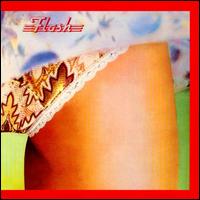 Flash
(1972),
***1/2
Flash
(1972),
***1/2
The
illegitimate son of Yes, with similar looks (sounds), but not the
same brains. After being kicked out of Yes, Banks formed Flash
and Kaye pitched in after Yes dumped him.
As such, Flash has a good claim to the legacy of early Yes, so it
comes as no surprise that Flash continued this sound. This
album sounds like an attempt to recreate The
Yes Album
with
strong guitars, minimal synthisizers and multipart song
structures.
"Dreams of Heaven" typifies this approach: classical guitar
bits, shifting time signatures, and mystical lyrics. Colin
Carter sounds like a Jon Anderson knock-off, but suffers
from sheep-like noises at the end of phrases when he lets his pitch
and vibrato loose (baa-ing, I call it). He also co-wrote most
of the album with Banks. His voice sounds comfortable only on
the slower, odd closer "The Time It Takes". Otherwise,
drummer Mike Hough is average and bassist Ray Bennett is decent.
Bennett also contributes two songs, the acoustic "Morning Haze"
(something the post-Banks never did) and "Children of the
Universe" practically bubble with enthusiasm. A few words
on Banks - he's good, his classical guitar style is a bit closer to
Robert Fripp, he changes tones a
good deal (like Howe) and his solo lines are shorter. Yes, the lyrics
throughout tend to be mystical nonsense, but Yes is just as bad.
Finally, Flash
only falls apart
with the opening track "Small Beginnings", which sounds
like any old group trying to imitate Yes. If you like The
Yes Album this
is a good find, but do not look for the experimentation of Fragile.
The album quite well in the US, as did "Small Beginnings",
with both hitting the Top 40. Produced by Derek Lawrence.
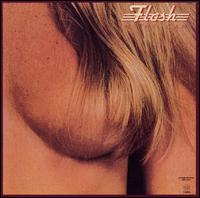 Flash:
In the Can (1972),
***
Flash:
In the Can (1972),
***
The burden fell on Banks and Bennett to fill
Kaye's space this time around, which they did admirably. In
the Can is
Flash's most rocking album, as the two lead the band through a
plethora of riffs and sections. The band's sounds better almost all
around: the production is a mite better, Banks's use of varying tones
is well done and even Hough clawed himself onto the B-List.
Unfortunate then that Carter was still an awful vocalist;
multi-tracked vocals attempt to compensate his voice's tendancy to
take a dive at the end of a phrase, but it results in divergent vocal
gusts. The lyrics are also a disappointment. While Flash
had the usual
mystic gibberish that might have meaning, In
the Can's
lyrics are either romantic tripe ("Monday Morning Eyes") or
overblown ("Black and White" which devolves into "Make
love, last longer" which sounds like a spam email), further shot
by Carter's reading of them. Still, the longer songs are musically
strong ("Lifetime", "Black and White", "There
No More"), even if they take cues from Yes (the intro to
"Morning Morning Eyes" sounds a lot like Fragile)
and they generally stick with the familiar ABCDEA structure.
With only guitar
and bass as lead instruments, Flash was certainly one of the more
straight rock progressive groups out there. Indeed, In
the Can has
no attempts at outright classicism or classical instrumentation,
making them relatively unpretentious and fairly good to boot. Too bad
Carter was dreadful; he must have been a chick magnet or something.
Lawrence produced again.
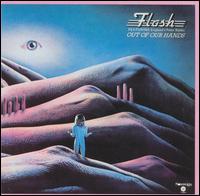 Flash:
Out of
Our Hands (1973),
**
Flash:
Out of
Our Hands (1973),
**
The
cover of this proclaims it is "FEATURING England's Peter Banks"
which makes me wonder: is there an American Peter Banks with whom
Banks did not want to get confused? Certainly nobody wants to
get mixed up with "England's Tony Banks," but was Banks
famous enough to justify this pronouncement? The cover art is
weird in and of itself, a collage of knuckles, fingers and an eye,
with a open-armed naked lady (or Roger Daltrey) turned around. As for the
music, Flash was fundamentally sound, and their self-production is
good. The main winner is Bennett's Rickenbacker, which makes
him sound even more like Squire. He has some nice
interplay with Banks, who was trying his best through this sub-par
material. However, prepare to
cringe whenever Carter opens his mouth because he still cannot
sustain a pitch (and
goes flying around), and there are some real specimens for lyrics
("The Bishop" has 'Wino gourmet / Kipper fillet / Breakfast
Boffin / Sending letters to his MP / Hoping he will eat it').
In fact, this is Out
of Our Hands'
main problem - too many words. No, it is
not a concept album; Ray Bennett wrote merely 5/6ths of one, with
with a couple of negligible Carter tunes tacked on to the end.
Bennett's work, entitled "Catalina", is like The
Day the Earth Stood Still -
a sci-fi story about an alien coming to help Earth, although
"Catalina" focuses more on action back on the alien
planet. Well, maybe it does. You can't really tell.
Bennett uses a Tommy
approach - giving
different characters their own songs, but even vaguer than
Townshend about the action. Even with the liner notes, one is
not quite sure how the songs fit into the story, or who the
characters are. Oh, and the characters are named after chess
pieces. To be blunt, it's pretentious and half-assed, which is
not a great combination. Beyond that, when the band starts to
get into a groove, things take off (the "Escape" portion of
"Psychosync"), and Banks has a couple of excellent intros
and outros (the banjo at the start of "Man of Honour").
Carter's two songs ("Manhattan Morning" and "Shadows")
get similar treatment - sandwiching a fairly blasť song in
between the band's good playing. The early Yes comparison is
still valid, and Bennett does borrow the overlapping vocal line
technique of Close
to the Edge at
the end of "Psychosync (Farewell Number Two)". Banks
only gets one co-write, so he was either being generous and letting
the other band members get their songs in or he was stockpiling (a
song entitled "Out of our Hands" later opened off the first
Empire album.) There are some good moments, but otherwise
this is an album too focused on a story and not on the telling.
Out
of Our Hands had a low charting position in the US, and Flash broke up soon
afterwards because of "management disputes" or the like.
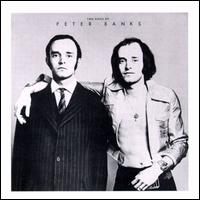 Peter
Banks: Two
Sides of Peter Banks (1973),
****
Peter
Banks: Two
Sides of Peter Banks (1973),
****
One of my favorite instrumental albums, Two Sides is a classical
and jazz fusion album, and luckily has sparing use of synths. The album starts
with some peaceful and beautiful classical guitar work by Banks ("The
White House Vale") which builds into Flash-style rock
("Knights"). That is followed by a couple of short
closing numbers, reiterating the previous musical themes. Of
these, "Battles" is the best, with Phil Collins
contributing some kick-ass beats. The back side mainly consists
of all-star electric "spontaneous jams" (as the back cover
puts it), with "Stop That!" regretfully wandering around
for its thirteen+ minutes. However, Banks put in a wise call to
Jan Akkerman, the Dutch guitarist from Focus, and gets some good
lines out of him amidst this. Akkerman also contributes a
wonderful classical piece "Beyond the Loneliest Sea" which
is almost too awesome for words. The album ends on a good note,
with Akkerman and Banks dueling it out in "Get Out of My
Fridge", which is a directed jam. The main players are
Collins, Akkerman, and Ray Bennett, with Mike Hough, Steve Hackett
and John Wetton making brief
appearances. It's peaceful, calm and without Colin Carter.
Out of print on CD, but not impossible to find. Self-produced.
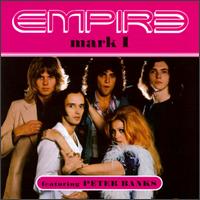 Empire:
Mark I (rec.
1974, rel. 1995), ***1/2
Empire:
Mark I (rec.
1974, rel. 1995), ***1/2
By
now Banks had recorded three albums of Yes-sounding material with
Flash, and a solo album of classical and progressive jam
explorations. It is both astonishing and understandable that
this record never found a label, as it combines all of these sounds
and more. Empire was a notch above Flash, but the band's real
key is Sydney Foxx, both an excellent singer and Banks's
then-wife (despite the porn star name). Her lyrics and Banks'
playing result in, well, romantic progressive rock with a
female vocalist. Sure, in many ways Mark
I is the same sort
of thing Banks tried with Flash (witness "Out of Our Hands"),
but Foxx's lyrics are often directed to
a woman, which throws an
intriguing kink in things. This is sort of material Yes used
to record, but Foxx's voice is a lot more soothing than Jon
Anderson's. She has a smooth voice, like a folk singer, but
deeper, and she gets rather bluesy with it as well. Foxx's
vocals provide Banks with something he can focus on besides his own
high-quality jazzy playing (the end of "Sky at Night" is a
beautiful multiple overdub of Foxx), and there are lots of
atmospheric keyboards from Jakob Magnusson. As if it was not
enough that Empire focused on love songs in a genre that had long
ascended to a higher plane, Banks piles in different genres. In
addition to the aforementioned blues ("Someone Who Cares"
which drags on), the aching-to-be-a-hit-single, "Hear My Voice
on the Radio" has a surprising country/honky-tonk flavor. Empire
may have been all over the map stylistically, but truely it is not so
far away from where Yes had gone, and Banks does not give himself
over to simple genre exercises either (the ballad "For a
Lifetime" has a backwards guitar solo, for example). The
key difference between Empire and Yes is that Banks still remembers
how to arrange his songs well, sticking to shorter runs and
introducing new ideas at reasonable intervals (the longer prog-rock
"Shooting Star"). Yet another unheralded testament to
Banks's capabilities. The rhythm section is John Giblin (bass),
and Preston Ross-Heyman (drums) both later of Phil Collins's Brand X,
and Collins himself appears at one point.
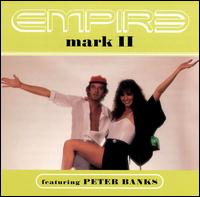 Empire:
Mark II
(rec.
1977, rel. 1996), **
Empire:
Mark II
(rec.
1977, rel. 1996), **
The
first Empire album did not deserve to go unreleased, but this one
certainly did. Banks and Foxx had moved to America to try and
get the first album released, got divorced, and then
recorded this
album without a real band. While the first album was the
product of a prog-rock group, just a rather light one, this is even
less rocking (in a prog sense) than before. The rhythm section
is clunky and more rock-influenced (read less technical or jazzy) and
the sparse keyboards are even more in the background. Like some
old vaudeville act going out on stage for the nth time with weary
smiles and cracked shoe leather, so comes Banks and some of the old
material from Mark
I.
Length was not a huge concern before, but now "Out of Our Hands"
(retitled as "Still Out of Our Hands") gets pushed to over
eight minutes. "Sky at Night" gets reworked a little
into a quiet, classical piece, but this version is not as good as the
original. Given their divorce, one would expect that Foxx's
lyrics would be less love filled, and they are ("Everything
Changes" is not just about the time signature). A good
deal of the time she sounds like a club singer or the progressive
equivalent of Stevie Nicks (the would-be single "Destiny").
All these changes would not be so bad if Banks didn't lay a brick
every time he tried to out and out solo. This album's magnum
opus, "Everything Changes" is fine through seven minutes,
but then Banks adds five minutes of erratic soloing at the end which
kills the song. In fact, he seems to have forgotten how to end
songs, period. His style has not changed much, but there are a
few nods towards real rock (the Who-styled power chords on "Do
What You Want"), and he does come up with a few moments of pure
brilliance (the whole tone scale intro to "Everything
Changes"). One of the attractions of the first Empire
record was its light-sounding production, but it was not reproduced
here, partially due to the clumping backing, and some questionable
production choices (why have the drum rolls panned a la Carl
Palmer?). The end result is an album with a couple of decent
tracks, "Destiny" and "Do What You Want", and a
collection of dysfunctional problems. For Banks fans only.
The band is Jeffrey Fayman (drums), Chad Peery (bass), and Robert
Orellana (keyboards), with Magnusson appearing somewhere.
Produced by Banks and John Arias.
Empire: Mark III (rec. 1978, rel. 1996)
Banks' last attempt at Empire, recorded in LA.
Banks released some solo albums in the 1990s, which I have not heard.
 Flash
(1972),
***1/2
Flash
(1972),
***1/2




